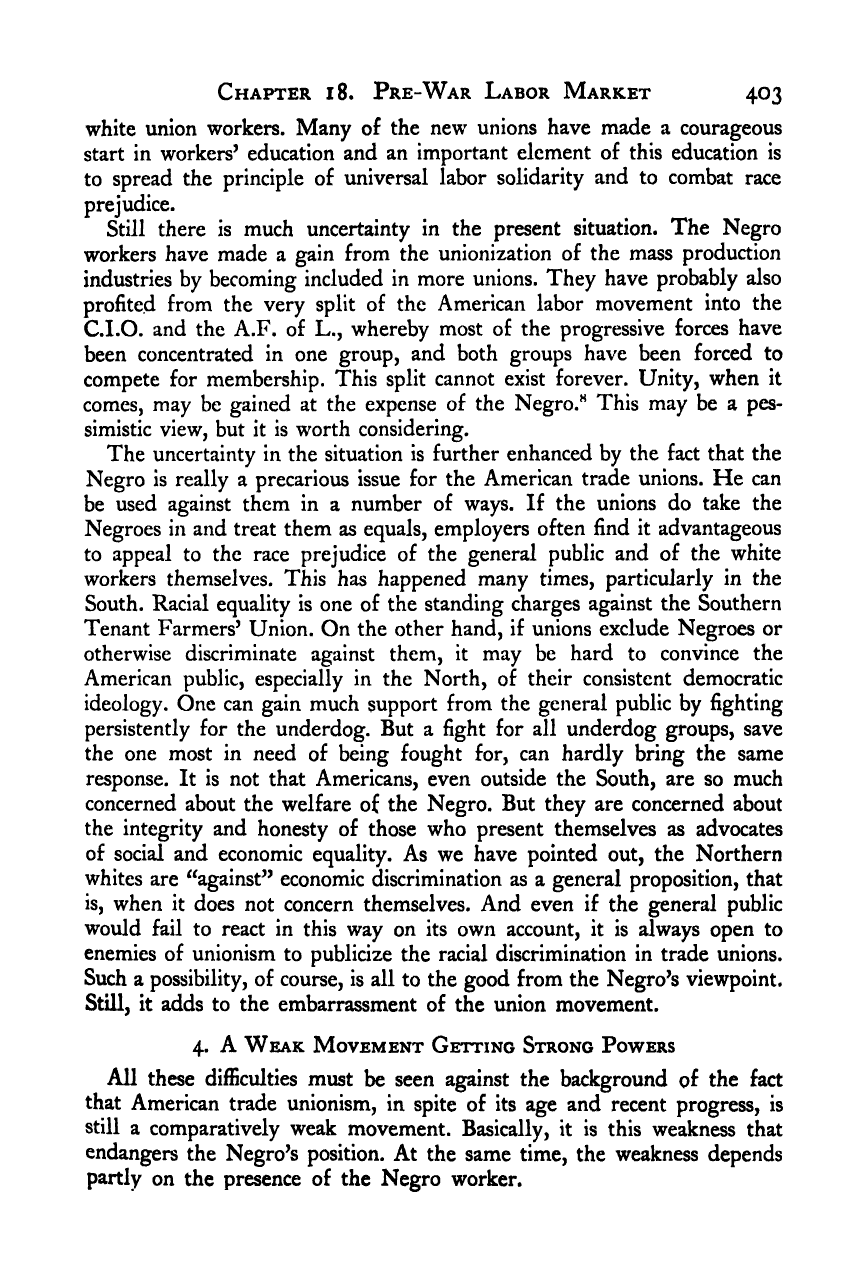Note: Gunnar Myrdal died in 1987, less than 70 years ago. Therefore, this work is protected by copyright, restricting your legal rights to reproduce it. However, you are welcome to view it on screen, as you do now. Read more about copyright.
Full resolution (TIFF) - On this page / på denna sida - IV. Economics - 18. Pre-War Labor Market Controls and Their Consequences for the Negro - 3. Labor Unions and the Negro - 4. A Weak Movement Getting Strong Powers

<< prev. page << föreg. sida << >> nästa sida >> next page >>
Below is the raw OCR text
from the above scanned image.
Do you see an error? Proofread the page now!
Här nedan syns maskintolkade texten från faksimilbilden ovan.
Ser du något fel? Korrekturläs sidan nu!
This page has never been proofread. / Denna sida har aldrig korrekturlästs.
Chapter i8. Pre-War Labor Market 403
white union workers. Many of the new unions have made a courageous
start in workers^ education and an important element of this education is
to spread the principle of universal labor solidarity and to combat race
prejudice.
Still there is much uncertainty in the present situation. The Negro
workers have made a gain from the unionization of the mass production
industries by becoming included in more unions. They have probably also
profited from the very split of the American labor movement into the
C.I.O. and the A.F. of L., whereby most of the progressive forces have
been concentrated in one group, and both groups have been forced to
compete for membership. This split cannot exist forever. Unity, when it
comes, may be gained at the expense of the Negro.” This may be a pes-
simistic view, but it is worth considering.
The uncertainty in the situation is further enhanced by the fact that the
Negro is really a precarious issue for the American trade unions. He can
be used against them in a number of ways. If the unions do take the
Negroes in and treat them as equals, employers often find it advantageous
to appeal to the race prejudice of the general public and of the white
workers themselves. This has happened many times, particularly in the
South. Racial equality is one of the standing charges against the Southern
Tenant Farmers’ Union. On the other hand, if unions exclude Negroes or
otherwise discriminate against them, it may be hard to convince the
American public, especially in the North, of their consistent democratic
ideology. One can gain much support from the general public by fighting
persistently for the underdog. But a fight for all underdog groups, save
the one most in need of being fought for, can hardly bring the same
response. It is not that Americans, even outside the South, are so much
concerned about the welfare of the Negro. But they are concerned about
the integrity and honesty of those who present themselves as advocates
of social and economic equality. As we have pointed out, the Northern
whites are ^^against” economic discrimination as a general proposition, that
is, when it does not concern themselves. And even if the general public
would fail to react in this way on its own account, it is always open to
enemies of unionism to publicize the racial discrimination in trade unions.
Such a possibility, of course, is all to the good from the Negro’s viewpoint.
Still, it adds to the embarrassment of the union movement.
4. A Weak Movement Getting Strong Powers
All these difficulties must be seen against the background of the fact
that American trade unionism, in spite of its age and recent progress, is
still a comparatively weak movement. Basically, it is this weakness that
endangers the Negro’s position. At the same time, the weakness depends
partly on the presence of the Negro worker.
<< prev. page << föreg. sida << >> nästa sida >> next page >>